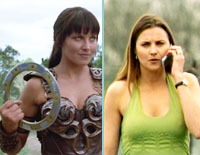May 2, 2005
Rejected Column Titles: "Kirk Wouldn't Stoop That Low", "Tea, Earl Grey, Hot," "Resistance is Futile," and "some sort of Locutus pun?" This one goes out to all the nerds in the hizz-ouse.
Holographic wowWhere Have All My Sci-Fi Heroes Gone?

|
Is it wrong for to want my sci-fi idols to stay in the genre? Is it possible to have a long career in sci-fi and stay respectable? For my sci-fi idols to stay sci-fi, do they have to do things like Locusts? Well, let's look at what some of the cult favorites are doing these days.
Jerry O'Connell, star of not only Sliders but the fine series My Secret Identity, is now "Woody" on Crossing Jordan, riding shotgun to Jill Hennessy's title character. I never saw you as a sidekick, Jerry. It's a sad, sad day. (This show also boasts the mainstreaming of Miguel Ferrer, once a mighty sci-fi warrior in Twin Peaks and the TV mini-series version of The Stand.) And what of Jerry O'Connell's brother Charlie? Also a Sliders alum, he is now... The Bachelor, and has managed to sink the once hit reality show into Sliders-esque ratings. That's ok, we never wanted him in sci-fi anyway.
In these cases, going mainstream seems like selling out, but that's not true for everyone. Some of our sci-fi brethren, despite having gone mainstream, have landed on their feet. Bill Shatner and Rene Auberjonois (Odo from DS9) on Boston Legal are good examples. While the courtroom drama is not sci-fi, the show, and their roles, are perfectly respectable. But it's worth noting they both had careers before Star Trek. And Lois and Clark's Teri Hatcher is doing better than ever on Desperate Housewives (anyone who wants to claim Lois and Clark is not sci-fi needs to watch those HG Wells episodes again).
And the former cast of Roswell have spread to the four corners of network TV — and while Roswell's ratings left much to be desired, it seems these days all you need to form a hit show is to hire one of their alums. Adam Rodriquez is on CSI: Miami, Katherine Heigl is on Grey's Anatomy, Emilie De Ravin is on Lost, and all racking up the ratings. To be fair, Lost is still essentially a sci-fi show (as far as we can tell anyway) and also boasts Babylon 5's Mira Furlan occasionally.
So when our heroes can fare well in the mainstream, can we blame them for crossing over? Because it seems like they don't do so well when they stay in the genre. When you see Quantum Leap's Sam (Scott Bakula) sailing on the fledgling ship Enterprise or the mighty Hercules (Kevin Sorbo) finding a much smaller place in syndication on Andromeda, you see why some idols jump ship to the real world. Not that Enterprise and Andromeda are terrible, they can both be alright sometimes, but they pale in comparison to the former glories of these mighty captains.
So I suppose I can't blame these idols for going mainstream, but it doesn't stop me from feeling a little bit betrayed. Still, sci-fi stardom can be unforgiving, with actors being branded by that role for years. The actors of modern Star Trek series seem to almost be cursed when it comes to sustaining successful acting careers, with only a few exceptions.

|
In the end, when your sci-fi idols leave you for the golden shores of higher paydays or the desperation of career survival, it can be a hard thing to accept. You have taken them into your homes and they have become that character. Sci-fi fans can be possessive, but we can't begrudge our idols happiness in other genres either. So although so many of them have left me, I will simply remember the joy they once brought me and wish them well. Probably.
IN TWO WEEKS: A retelling of the shrinking of the ship Enterprise, a look at the much awaited and already berated final episode.
Email the author.
All written content © 2005 by the authors. For more information, contact homer@smrt-tv.com
